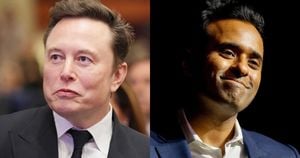Rachel Reeves, the UK’s Chancellor, has been making headlines lately, especially after she firmly ruled out importing chlorinated chicken and hormone-injected beef from the United States as part of any potential post-Brexit trade deal with President-elect Donald Trump. This declaration indicates not only Labour's commitment to British farming standards but also highlights the delicate balance they need to maintain amid rising economic challenges.
Recent official data has shown the UK economy struggling to gain momentum, with growth stalling under Labour’s tenure. Her insistence on opposing the import of products like chlorinated chicken—which many believe are detrimental to health and safety—comes as she faces increasing scrutiny over Britain’s flatlining economic performance. During her remarks to the media, Reeves made it clear: "We're not going to allow British farmers to be undercut by different rules and regulations." This stance could be seen as positioning Labour as the party of protection for British agricultural interests, amid fears of unfair competition from overseas.
The situation is made more challenging with Reeves stating, "I am not satisfied with these numbers," as she grapples with the reality of economic growth being minimal. Official figures revealed only 0.1% growth between July and September, following what had been hoped to be flourishing economic statements. Previous expectations had put GDP growth at around 0.2%, but actual results fell short, raising questions among economists about Labour’s fiscal policies and their impact.
Trade with the US is pivotal for the UK, with over £300 billion flowing between the countries each year. Reeves is eager to capitalize on this, expressing her anticipation for working with Trump, as she elaborated, "We want to see our trade increase, whether that's through a free trade agreement or other improvements." Still, the prospect of negotiating terms with Trump, whose policies can often lead to unexpected tariffs and trade wars, adds complexity to the financial dynamics between the two nations.
Speaking of tariffs, tensions could arise as Trump has hinted at imposing substantial levies on imports, including 20 percent on goods entering the U.S., which could be disastrous for British exporters. Reeves was cautious, voicing her opposition to tariffs, stating, "They push up prices for consumers in Britain and the United States... we'll make the case for free and open trade."
The economic strain might soon force Reeves and her party to rethink their commitments. A noticeably high ire over Labour’s decisions surrounding inheritance tax on farmers had been brewing, pushing those in the agricultural sector to reconsider the party's reliability as stalwarts of their interests.
With farmers already expressing dissatisfaction, Reeves' approach must navigate these pressures carefully, particularly as she aims to project Labour as the vibrant force it claimed to be during the last election campaign. But the reality is stark, with predictions signaling continued slow growth for the economy. This environment presents both opportunities and urgent challenges as Labour endeavors to connect with voters and business leaders alike.
Criticism from opposing parties is likely to intensify as well. Shadow Chancellor Mel Stride has confronted Reeves, saying, “Because of the Chancellor’s choices, these figures are not likely to improve,” pointing out the deficit of recent changes and indicating an increase of pressures on Labour to deliver on their promises.
Meanwhile, Reeves is showing her determination; she announced plans to reduce some regulations imposed post-2008—things she describes as "too far." This proposal seeks to draw businesses back and ingratiate herself with economic leaders, aiming for strategies to stimulate growth. Yet, as she emphasizes ambitious notions of free trade, the public remains weary about the ramifications, especially concerning labor and environmental standards.
Reeves' recent remarks coincide with the Bank of England's call for improving relations with Europe, following Brexit. This adds another layer of complexity to the negotiations Reeves anticipates with the U.S. supporting UK economic rounds. The balancing act of boosting American trade relations without compromising local interests remains pivotal to Labour’s strategic position.
The dynamics between the UK and US economy are certainly subject to rapid changes, especially under Trump’s administration which has previously emphasized “America First” policies. Each step taken will be watched closely, as any decision could sway the fragile equilibrium of British market stability.
While Reeves presents herself as proactive and ambitious, the reality of the UK economy’s current state stirs doubts about whether the Labour policies can genuinely thrive. Can they bring about the necessary momentum for growth without sacrificing core domestic values? The coming months will be pivotal as she navigates international trade negotiations and the intricacies of political and economic pressures back home.
All these challenges and controversies reflect back on Labour’s future, posing the question: is Rachel Reeves equipped to spearhead the party through these treacherous waters? With doubts looming over her economic management amid concerns of slow growth and political pushback, the Labour Party may find this transitional period to be more challenging than anticipated.



